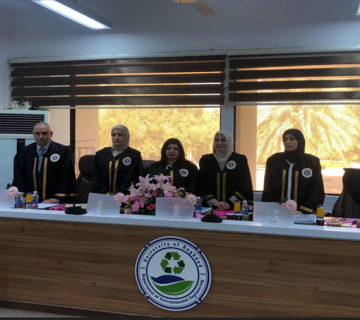The public discussion of the master’s student (Najwan Mohammed Swadi) from the Department of Electronics and Communication Engineering on her thesis entitled (Machine Learning-Based Interference Mitigation for Millimeter Wave Communications in 5G Networks) was held on Monday 16/9/2024 in the discussion hall in the Department of Electronic Engineering and Communications.
The discussion committee consisted of the following respected members:
- Prof. Dr. Imad Hassan Abood (Chairman)
- Prof. Dr. Dhiaa Jassim Kadhim (Member)
- Asst. Prof. Dr. Aqeil Nima Zaayan (Member)
- Asst. Prof. Dr. Firas Ali Saber (Supervisor)
The (thesis) aimed to ((i) Investigate and survey the current state-of-the-art of millimeter-wave communications, cloud radio access network architecture, and machine learning algorithms; (ii) Utilize the up-to-date algorithms applied in the field of wireless communications, especially for mmWave communications, to mitigate interference and evaluate them in terms of different performance criteria).
Accordingly, the message came out with a set of recommendations, including:
- Applying a user association strategy with remote radio heads using machine learning in heterogeneous cloud radio access networks demonstrates proven effectiveness in improving network performance. It adapts quickly to varying traffic loads, maximizes the overall system throughput achieved by users, and reduces interference. This is due to the use of an optimal selection policy during exploration when employing machine learning, leading to more efficient signal direction and reduced signal loss. Additionally, it enables efficient load distribution across cell locations with the best signal strength, despite obstacles, reducing congestion on specific units and enhancing overall performance.
- The proposed solution for assigning remote radio heads to baseband units in heterogeneous cloud radio access networks determines the number of radio access point clusters and the number of active baseband units in the network. This relies on various clustering techniques to efficiently allocate computing resources based on user demand.
- Utilizing association and clustering algorithms based on the strategic use of machine learning, combined with the deployment of smallcell remote radio heads utilizing millimeter waves, can significantly enhance network performance, especially in dense urban environments.
After the scientific discussion by the gentlemen members of the discussion committee, the researcher received a rating of (Very Good).







